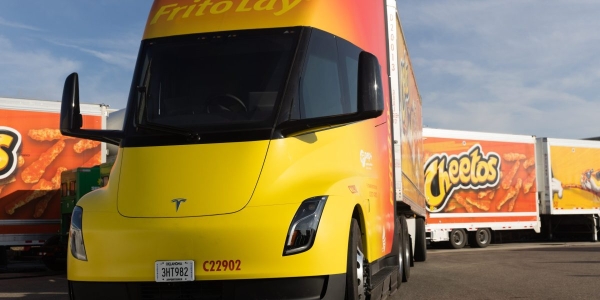
Elon Musk giddily announced the first commercial delivery of his new electric-powered container truck to PepsiCo at a press conference last December, calling the new model “the most badass rig on the road.” He pitched the Tesla Semi as a major step towards reducing carbon emissions, replacing dirty gas-powered trucks with cleaner, silent electric models.
The reveal was the culmination of a four-year-long wait for the electric container trucks, originally unveiled in 2017 and originally targeted for production in 2019.
Yet a recall notice released last week by the National Highway Traffic Safety Administration suggests the company is still struggling to ramp up production of the container truck, with potentially just one truck produced in a two-week period.
On Tuesday, the NHTSA announced that Tesla trucks produced between Nov. 30 and March 15 will need to have their software updated. The update resolves a software flaw that allowed drivers to dismiss warnings of an unsecured door, according to Elektrek.
The notice also shared the number of units covered by the recall: a total of 36.
The number aligns with the number of trucks PepsiCo currently says they own. “We have the 15 in Modesto that we’re launching…and then we have 21 in Sacramento,” Mike O’Connell, Pepsi’s vice-president for supply chain, told CNBC in February.
Last week’s recall is the second involving the Tesla Semi. In mid-March, the NHTSA issued a notice covering 35 units produced between Nov. 30 and Feb. 28. Elektrek notes that the two recall notices implies that Tesla managed to produce just one truck in the 15-day window.
It’s possible Tesla produced Semis not covered in the recall notice, and that the company has ramped up production since mid-March. Yet the numbers suggest that the company is far from its original target of 50,000 trucks produced in North America by the end of 2024.
(To compare, companies bought 254,000 “Class 8” vehicles—a category of heavy truck that includes the Tesla Semi—in the U.S. in 2022, according to the National Automobile Dealers Association.)
Tesla did not immediately respond to a request for comment.
Tesla produced almost 441,000 cars globally in the first quarter of 2023.
The company is investing more in truck production, spending $3.6 billion to expand its facilities in its Nevada Gigafactory. A new production line in Nevada plans to produce five trucks a week, reported Elektrek in March.
Yet Musk himself is downplaying his earlier target for Semi production. At a conference in Texas last week, the Tesla CEO forecast that the carmaker won’t be able to make large volumes of the Semi until the end of next year. He cited issues with battery supply.
“The future is a massive increase in electricity demand, and it’s going to take everything that we’ve got just to keep up with it,” he said.
